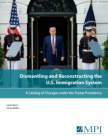Refugee & Asylum Policy
Recent Activity

The Importance of Family, Friend, and Neighbor Care for Immigrant and Dual Language Learner Families
In this webinar, speakers examine the critical role of child care provided by family, friends, and neighbors (FFN) for immigrant families and program and policy approaches to more equitably serve and support FFN caregivers.

This webinar marks the release of a report examining the state of Costa Rica’s institutional framework and initiatives supporting the integration of migrants and refugees, a particularly critical policy area as the immigrant population continues to grow. The event was in Spanish and this is the live English interpretation.

Este webinar marca la publicación de un informe que examina el marco institucional y las iniciativas del estado de Costa Rica que apoyan la integración de migrantes y refugiados, un área de política particularmente crítica a medida que la población inmigrante continúa creciendo.

With migration a dynamic phenomenon in the Americas, the U.S. government increasingly is realizing that migration management should be viewed in a regional context. This requires a new set of policies and ways of engagement with countries in North and Central America, and beyond, as MPI President Andrew Selee discusses with colleague Andrea Tanco in this episode of our World of Migration podcast.

MPI’s 20th Anniversary Conference featured the Director-General of the International Organization for Migration, António Vitorino, in an armchair conversation with MPI co-founder and President Emeritus Demetrios G. Papademetriou, as well as a panel discussion with UN High Commissioner for Refugees Filippo Grandi and MPI co-founder Kathleen Newland and KIND President Wendy Young.























Regional Processing Centers: Can This Key Component of the Post-Title 42 U.S. Strategy Work?